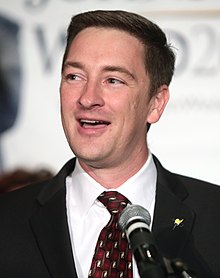Portal:Libertarianism
Introduction
Libertarianism (from French: libertaire, itself from the Latin: libertas, lit. 'freedom') is a political philosophy that upholds liberty as a core value. Libertarians seek to maximize autonomy and political freedom, emphasizing equality before the law and civil rights to freedom of association, freedom of speech, freedom of thought and freedom of choice. Libertarians are often skeptical of or opposed to authority, state power, warfare, militarism and nationalism, but some libertarians diverge on the scope of their opposition to existing economic and political systems. Various schools of libertarian thought offer a range of views regarding the legitimate functions of state and private power. Different categorizations have been used to distinguish various forms of Libertarianism. Scholars distinguish libertarian views on the nature of property and capital, usually along left–right or socialist–capitalist lines. Libertarians of various schools were influenced by liberal ideas.
In the mid-19th century, libertarianism originated as a form of left-wing politics such as anti-authoritarian and anti-state socialists like anarchists, especially social anarchists, but more generally libertarian communists/Marxists and libertarian socialists. These libertarians sought to abolish capitalism and private ownership of the means of production, or else to restrict their purview or effects to usufruct property norms, in favor of common or cooperative ownership and management, viewing private property as a barrier to freedom and liberty. While all libertarians support some level of individual rights, left-libertarians differ by supporting an egalitarian redistribution of natural resources. Left-libertarian ideologies include anarchist schools of thought, alongside many other anti-paternalist and New Left schools of thought centered around economic egalitarianism as well as geolibertarianism, green politics, market-oriented left-libertarianism and the Steiner–Vallentyne school. After the fall of the Soviet Union, libertarian socialism grew in popularity and influence as part of anti-war, anti-capitalist and anti- and alter-globalisation movements. (Full article...)
Selected article
Anarcho-capitalism is a right-libertarian and individualist anarchist political philosophy that advocates the elimination of the state in favor of individual sovereignty in a free market. Economist Murray Rothbard is credited with coining the term. In an anarcho-capitalist society, law enforcement, courts and all other security services would be provided by voluntarily-funded competitors such as private defense agencies rather than through taxation and money would be privately and competitively provided in an open market. According to anarcho-capitalists, personal and economic activities would be regulated by the natural laws of the market and through private law rather than through politics. Furthermore, victimless crimes and crimes against the state would not exist.
Anarcho-capitalists argue for a society based on the voluntary trade of private property and services (including money, consumer goods, land and capital goods) in order to maximize individual liberty and prosperity. However, they also recognize charity and communal arrangements as part of the same voluntary ethic. Though anarcho-capitalists are known for asserting a right to private property (individualized or joint non-public), some propose that non-state public or community property can also exist in an anarcho-capitalist society. For them, what is important is that it is acquired and transferred without help or hindrance from the compulsory state. Anarcho-capitalists believe that the only just and/or most economically beneficial way to acquire property is through voluntary trade, gift, or labor-based original appropriation, rather than through aggression or fraud.
Anarcho-capitalists see free market capitalism as the basis for a free and prosperous society. Rothbard said that the difference between free-market capitalism and "state capitalism" is the difference between "peaceful, voluntary exchange" and a collusive partnership between business and government that uses coercion to subvert the free market. "Capitalism", as anarcho-capitalists employ the term, is not to be confused with state monopoly capitalism, crony capitalism, corporatism, or contemporary mixed economies, wherein market incentives and disincentives may be altered by state action. They reject the state based on the belief that states are aggressive entities which steal property (through taxation and expropriation), initiate aggression, are a compulsory monopoly on the use of force, use their coercive powers to benefit some businesses and individuals at the expense of others, create monopolies, restrict trade and restrict personal freedoms via drug laws, compulsory education, conscription, laws on food and morality and the like. The embrace of unfettered capitalism leads to considerable tension between anarcho-capitalists and many social anarchists that view capitalism and its market as just another authority. Anti-capitalist anarchists generally consider anarcho-capitalism a contradiction in terms and vice versa.
Selected quote
| “ | My idea of a perfect government is one guy who sits in a small room at a desk, and the only thing he's allowed to decide is who to nuke. The man is chosen based on some kind of IQ test, and maybe also a physical tournament, like a decathlon. And women are brought to him, maybe...when he desires them. | ” |
| — Ron Swanson (2009) Parks and Recreation (Season 1) |
Selected picture
 |
General images
Selected biography -
Nicholas Joel Sarwark (born August 27, 1979) is an American attorney and businessman who served as the 19th chair of the Libertarian National Committee (LNC), the governing body of the Libertarian Party. Prior to his election in 2014, he served on several LP national committees and as chair of the Libertarian Party of Maryland State Committee and vice chair of the Libertarian Party of Colorado State Committee. , he is the only LP chair to have served three consecutive terms.
Sarwark declined to run for another term as LNC chair in 2020, and was succeeded by Joe Bishop-Henchman. (Full article...)Related portals
Parent portals
Socio-political portals
Topics
Categories
Points of interest
| Points of interest related to Libertarianism on Wikipedia: History – Portal – Category – WikiProject – Alerts – Deletions – Assessment |
Associated Wikimedia
The following Wikimedia Foundation sister projects provide more on this subject:
-
Commons
Free media repository -
Wikibooks
Free textbooks and manuals -
Wikidata
Free knowledge base -
Wikinews
Free-content news -
Wikiquote
Collection of quotations -
Wikisource
Free-content library -
Wikiversity
Free learning tools -
Wiktionary
Dictionary and thesaurus



































